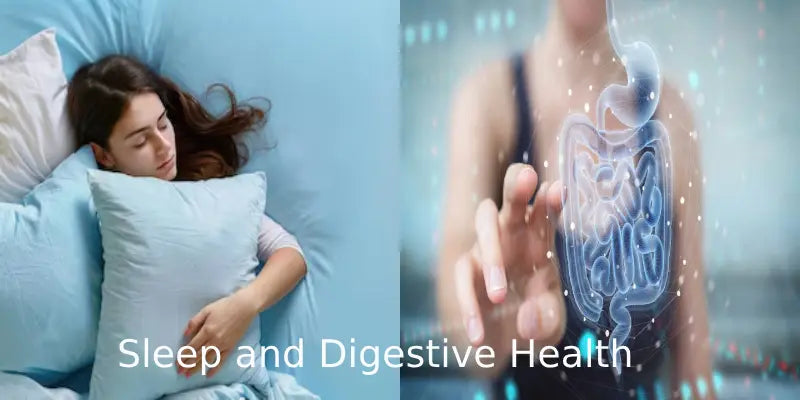
Sleep and Digestive Health: How Rest Influences Gut Function
It's important to get the recommended quantity and quality of sleep because it impacts more than just your level of fatigue. Both little sleep and poor sleep quality are linked to a higher risk of developing certain illnesses and cardiovascular problems.
You've probably felt the link between gut health and sleep if you've ever had uncomfortable stomach problems or noticed that your hunger wasn't there the day after a sleepless night. You are aware that, by themselves, gut health and sleep are essential for overall well-being. However, as it happens, their relationship might also be quite important.
We're only beginning to understand the intricacies of how sleep affects our gut health, for example, but we do know that sleep can have an impact on an individual's ability to sleep and that digestive health can influence both. In this blog, we’ll understand the link between sleep and digestive health and what you can do to improve your sleep and, hence, your digestive health.
Understanding the Link Between Digestive Health and Sleep
Many studies have found that certain types of bacteria in your gut microbiome are connected with sleep quality. And there's a connection between the kind of bacteria in your stomach and how well you sleep. It makes sense that there would be a connection between the gut and sleep given the relationships between the brain and sleep as well as the stomach and the brain.
Your brain and gut may interact in several ways due to their interconnectedness. These various processes, which are all mediated by your gut flora, can affect your stress levels, mood, appetite, and sleep patterns.
The gut-brain link operates in both directions. Your gut can send signals to your brain, which can then impact the composition of your gut microbiome.
Effects of Sleep on Digestive Health
- Acid Reflux: The discomfort of acid reflux is often brought on by sleep deprivation, which allows stomach acid to reflux back into the esophagus. Additionally, hormones that regulate hunger can become slightly out of control when you don't get enough sleep, which can result in an increase in appetite.
- Irritable Bowel Syndrome (IBS): Lack of sleep is associated with unpredictable and exacerbating IBS symptoms, influencing bowel movements and producing discomfort in the abdomen. Not to mention that you're more likely to reach for unhealthy foods as a quick energy boost when you're weary. (Consider sugar, trans fats, and processed carbs.) These foods have the potential to harm both your general health and your intestinal health.
- Constipation: Irregular bowel movements brought on by poor sleep patterns might aggravate constipation by interfering with the body's normal digestive function. Remember that your body is meant to be healing and performing housekeeping duties when you sleep, so you don't want it to be stressed out with digestion and absorption. It could also cause insomnia and keep you up.
- Inflammation: The digestive system is not the only part of the body that can become more inflamed due to sleep deprivation or poor quality. Many digestive problems, such as acid reflux, inflammatory bowel disease (IBD), and gastritis, are associated with chronic inflammation.
Tips for Improving Sleep and Digestive Health
- Establish a Sleep Schedule: A consistent sleep schedule can make a big difference in life. Try to sleep at the same time every single day, even on the weekends. This will keep your body's internal clock regulated, and you’ll get better-quality sleep at night.
- Create a Nighttime Routine: It is important to unwind before going to sleep. You can read a book, take a warm bath, or practice relaxation techniques like deep breathing or meditation. Just avoid doing activities that are overly stimulating, as they can prevent you from falling asleep.
- Balanced Diet: Avoid eating heavy meals just before bed; give your body enough time to digest the food; otherwise, you may face many digestive problems. Also, try to avoid caffeine, alcohol, and nicotine, as they can disrupt your sleep.
- Limit Screen Time: All the electronic devices that people use on a daily basis emit blue light that can interfere with the production of melatonin, a hormone that regulates sleep. Try to avoid screens for at least an hour before bedtime.
- Comfortable Sleep Environment: A good sleep environment not only helps you sleep faster but also improves the quality of your sleep. Always try to keep your room dark, quiet, and cool. Try to minimize noise that can interfere with your sleep.
Conclusion
Sleep and digestive health are intricately linked. By prioritizing good sleep habits, you not only enhance your overall well-being but also support a healthy digestive system. From regulating hormones to maintaining a balanced gut microbiome, adequate sleep plays a vital role in keeping your digestive system functioning smoothly.
You can follow the tips mentioned in the blog to get better sleep at night. One more thing you can do to get better sleep is replace your traditional pillow with an advanced one. The Bamboo Pillow is a great option to get better-quality sleep at night. Its memory foam filling conforms to the curve of your head and neck to provide you with the best possible support. Also, it maintains your hair and skin to stay young and rejuvenated.








